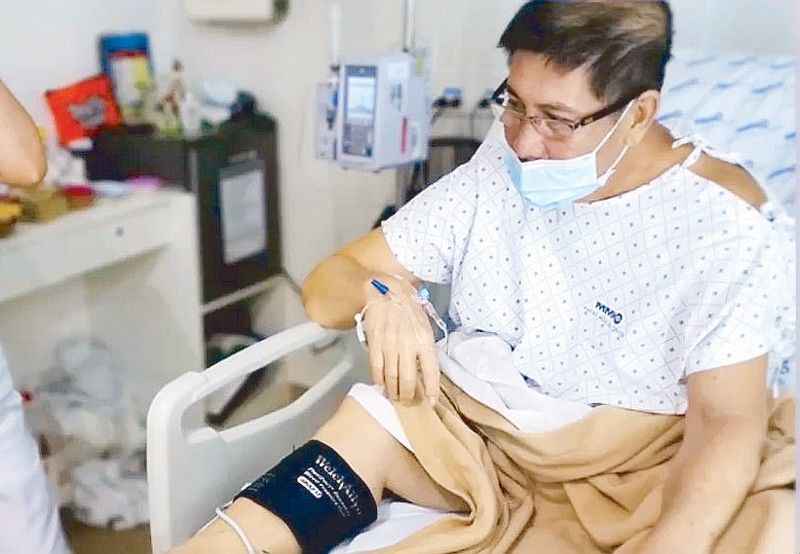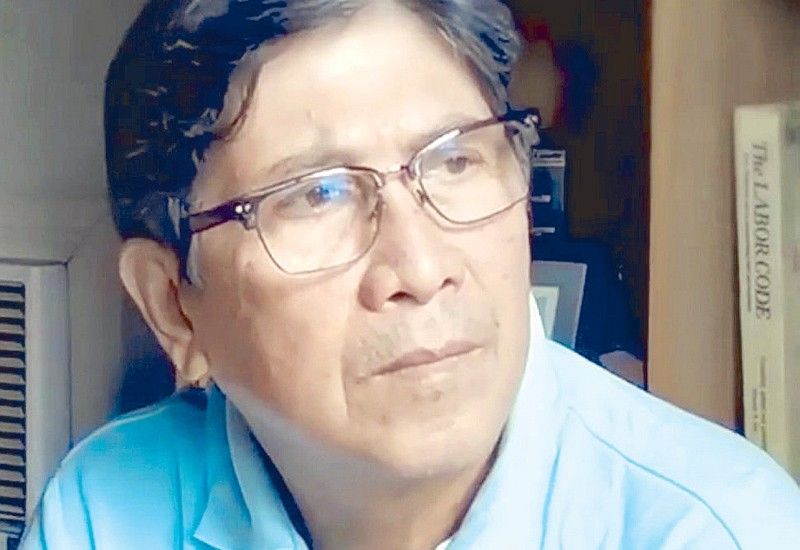It takes a village to beat cancer


Sometime in 2019, lawyer Benji Sequi felt bloated for weeks. But, like most astig men, he just blew off the possibility that his body was telling him something. It couldn’t be anything serious, he thought. Until one night, his eldest child noticed that his navel was protruded.
“Just like a pregnant woman’s belly?” he jokingly asked.
But his family was really worried and asked him to have himself checked.
Thank goodness, Benji listened. Because five months after his diagnostic test, he learned the most devastating news.
“They found a five-cm. mass on my liver,” he relates. “My doctor told me that I have advanced-stage liver cancer. And things didn’t look good.”
And when his son asked how much time he had left, Benji’s doctor hastily replied: “Six months. One year is long. Two years? A miracle.”
As expected, Benji put on a strong face for his family. But deep inside, “I was terrified.”
“My family was heartbroken,” Benji shares. “But I have a good team of doctors and a loving family, who made me feel safe and supported as I navigated my cancer treatment plan.”
Two years is the usual progression-free survival for liver cancer patients. And there were days when Benji got worried if the treatments would work.
“But never did I feel lost because my family and I keep each other strong,” he adds. “I continue to cling on to hope and faith.”
But it’s already 2022, almost three years since that dreadful day of Benji’s liver cancer diagnosis.
“I survived and lived to experience that miraculous two years,” he enthuses. “My cancer treatments are working. I know that there’s still a tough battle ahead, but I have my entire ‘village’ supporting me in my fight against the Big C.”

Cancer is no longer a death sentence
Benji’s testimonial was aired during the “Transformative Innovations in Cancer Care — The Way Forward” forum to spark hope and be a source of strength to other cancer patients and their families.
Held in observance of “World Cancer Day” on Feb. 4 and the third anniversary of the passing of the National Integrated Cancer Control Act (NICCA) on Feb. 14, the virtual forum tackled the crucial role of innovations in cancer care in transforming health outcomes for patients, their families and communities.
“Now more than ever, we can say that we are beating cancer,” says Teodoro Padilla, executive director of the Pharmaceutical and Healthcare Association of the Philippines (PHAP). “We are seeing significant health outcomes in terms of overall patient’s survival, delayed progression, and better quality of life.”
According to Padilla, several factors contribute to these dramatic developments. These include the biopharmaceutical innovations and medicines to treat all cancer types, among others.
“Today, cancer is no longer a death sentence,” Padilla notes. “The men and women in the biopharmaceutical industry are building on a pipeline that will transform cancer into just another chronic illness for patients of all ages.”

The way forward
But while multi-stakeholder groups from government, healthcare and advocacy organizations are seeing great progress in its fight against the disease, gaps in cancer care persist.
“We are not stopping from bridging these gaps in cancer care because there are ways forward,” Padilla says.
On Feb. 14, 2019, the landmark NICCA was signed into law. The law offers the promise of strengthening health systems’ capacities, increasing investments for better care, and timely access to quality services and medicines throughout the cancer care continuum.
Complementing the NICCA is the Universal Healthcare Act, which gives primary attention to the health of the people in communities. UHA also establishes the framework for the whole of systems, whole of government, and whole of society approach to health.
“True to the spirit of the whole-of-society approach, everyone here is a key actor in transforming patients’ lives,” Padilla adds. “And yes, as Mr. Sequi says, it is possible to face tomorrow with hope.”

Nicca: A gift to Filipino family and communities
“It’s been 10 years since my mother, the late Atty. Susana Vargas, was first diagnosed with stage 2 uterine cancer,” relates QC Rep. Alfred Vargas, the principal author of NICCA. “She fought courageously for two years. But she, too, succumbed to cancer on March 29, 2014. Hindi po biro labanan ang cancer. Ito ay laban hindi lamang ng mga cancer patients; ito ay laban din ng kanilang pamilya, kaibigan, doktor at pamayanan.”
According to Vargas, his mom and family’s experience in battling cancer, as well as the stories of many brave Filipino cancer patients and survivors, served as his inspiration in filing measures aimed at addressing the real sufferings and burden from this disease.
“The passing of the NICCA into law is truly a landmark legislation,” says Vargas. “It institutionalizes a comprehensive and holistic approach to addressing gaps in cancer control that have long been overlooked.”
The Cancer Control Act aims to provide affordable and accessible treatment, especially for lower-income cancer patients to prevent cancer-related deaths.
“With the help of our fellow advocates and colleagues in Congress, we were able to successfully include a P620 million Cancer Assistance Fund into an overall P756 million for the Cancer Supportive Care and Palliative Care Medicines Access Program in the 2021 National Budget,” Vargas cites.
This year, they were able to secure P786 million for the same budget, which would be used to provide free medicines for cancer patients, and P529 million for the Cancer Assistance Fund to further provide support for the Cancer Medicine and Treatment Assistance Program.
The program serves as a social protection mechanism that would cater to indigent and financially incapacitated populations, providing them equitable access to risk assessment, cancer screening, diagnosis, treatment, and care.
“And with the implementation of the so-called Mandanas ruling of the Supreme Court, which increases the IRA of LGUs, we have the opportunity to expand the Cancer Control Act,” explains Vargas.
Under the Cancer Control Act, LGUs are mandated to strengthen the capacity of public health systems and facilities, and the provision of care and services.
“These can be done through cancer care infrastructure, health education and promotion, and social protection mechanisms made accessible in their localities,” Vargas adds. “Let us all work together towards a country where there’s no more cancer that could break families apart.”
One can’t fight cancer alone. As strong as you are, you have to have good people in your corner. Indeed, teamwork makes the care work.
* * *
The virtual forum was organized by the Department of Health, Cancer Coalition Philippines, Philippine Alliance of Patient Organizations, Medicines Transparency Alliance, Zuellig Family Foundation, CitizenWatch, Galing Pook, Philippine Cancer Society, AC Health, and PHAP and its members.



















